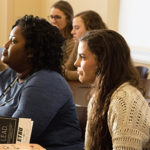Since November 2005, Tony Celelli has served as president and CEO of the Christian Education Activities Corporation, d/b/a South Texas School of Christian Studies, in Corpus Christi, Texas. From deep in the heart of one Texan, he shares his background and thoughts on leading that seminary. To suggest a Baptist General Convention of Texas-affiliated leader to be featured in this column, or to apply to be featured yourself, click here.
Background
Where else have you worked, and what were your positions?
- Founding pastor of The Station Church, Corpus Christi, Texas (July 1999 – May 2005)
- Minister of spiritual formation/administration, Second Baptist Church, Corpus Christi, Texas (Jan. 1998 – Nov. 2005)
- Minister of education and youth, Crestview Baptist Church, Georgetown, Texas
- Director of operations, Grace-Aire Medical Foundation, Corpus Christi, Texas
- Minister to students, First Baptist Church, Baird, Texas
- Youth minister, Belmont Baptist Church, Abilene, Texas
- Summer associate minister, Central Baptist Church, Clovis, New Mexico
Where did you grow up?
I grew up as an Air Force brat (a military dependent of parents who served in the United States Air Force) and lived essentially in two locations: Davis Monthan AFB in Tucson, Arizona, and Cannon AFB in Clovis, New Mexico.
How did you come to faith in Christ?
A godly neighbor in Clovis, New Mexico, took my sister and me to VBS and then church. When I was twelve, I heard for the first time that I was a sinner and needed a savior. I also saw a friend getting baptized and it made me curious, so I began to ask questions of the pastor.
Pastor Bob Vest took time to share with me the love of God through his Son, Jesus Christ, and how Jesus wanted to “sit in the big chair of my heart, but I had to invite him in.” I contemplated what it meant to ask Jesus to be Lord of my life.
Some weeks later, I walked the aisle on a Sunday night during a summer revival service and gave my heart to Jesus.
Where were you educated, and what degrees did you receive?
- D. leadership studies/ethics, Dallas Baptist University, 2012
- Div., Logsdon Seminary, Hardin-Simmons University, 2000
- B.S. applied theology/psychology, Hardin Simmons University, 1993
Ministry/Profession
Why do you feel called to your particular vocation?
Dr. James Shields was my faculty advisor during my undergraduate days at HSU. During my last semester, he challenged me to consider following God to the “unpopular places of ministry.” He said, “Young preacher boys like you seem to hear God call them to big cities, big churches, and big salaries. Why don’t you break the mold and not carry more water to the ocean?”
Those words of encouragement and chastisement shaped my ministry calling more than any other. At that moment, I asked God to send me to the unpopular places.
Now, the ironic part of my calling to SCS and the analogy of carrying water to the ocean is almost lost on the fact that my office overlooks the Bay of Corpus Christi and the Gulf of Mexico. Nevertheless, South Texas has never been a particularly easy or popular place for Baptist workers because of the strong Roman Catholic culture.
My calling to higher education came through the local church.
Please tell us about your BGCT institution—the breadth and nature of its work, including its mission, measures of scope, etc.
History (copied from website)
In 1945, several leading Baptists of South Texas met to consider the possibility of beginning a local college to train ministers and teachers. Two years later, Texas Baptists gave their support to the establishment of the University of Corpus Christi (UCC) on Ward Island, previously the site of a Top Secret U.S. military radar station. UCC continued as an effective four-year university until 1972. During these years the university fulfilled its purpose of training teachers and ministers who would become leaders in South Texas and beyond.
In 1970, Hurricane Celia destroyed most of the campus, with damages totaling over a million dollars. Due to the enormous financial pressure, Texas Baptists voted to give over two hundred acres of Ward Island to the city of Corpus Christi, who in turn made it available in 1973 to the state for the establishment of Texas A & I at Corpus Christi. The school later became Corpus Christi State University and is now Texas A&M University – Corpus Christi.
From the beginning of this process, however, Texas Baptists retained ten acres of land adjacent to the larger campus to be used for religious education. Baptists led the way for other denominations when undergraduate classes in religion began in the fall semester of 1977 through Howard Payne University (HPU). Despite the many challenges, SCS opened its main building, housing classrooms and offices, an auditorium, prayer chapel, library, and kitchen in 1980. The following year celebrated the first student to graduate from HPU at SCS.
In 1997, President Linn Self partnered with Dr. Vernon Davis, Dean of Logsdon School of Theology at Hardin-Simmons University, to offer the Master of Divinity program in Corpus Christi. By 2004, SCS opened the Stark Conference Center, adding much-needed classroom space, as well as living quarters for resident faculty and visiting guests. In the Fall of 2011, Hardin-Simmons University began offering bachelor degrees for South Texas students at SCS.
Read “The Lost Baptist University” by Dr. Tony Celelli for a detailed account of our journey from UCC to SCS.
Mission
SCS exists to equip the educationally underserved followers of Christ for service in the church and community.
- Underserved: nontraditional students are bivocational, older and ethnically diverse. SCS’s target audience is not the typical 18-to-24-year-old student, but rather the individual who feels called to sustained ministry preparation and can’t leave South Texas for various reasons.
- Service in the local church is the hallmark of SCS. We judge our success on the success of the local church.
What do you like best about leading your institution? Why?
Helping Christian leaders fulfill their God-ordained calling to be 21st-century ministers and missionaries in a desperate and dying world. We are making an eternal difference in the lives of those we equip and in the lives of those they reach and serve.
What aspect(s) of your institution and/or its mission do you wish more people understood?
The value of educating local church leaders. Society expects those with dangerous knowledge to be adequately trained. The doctor has dangerous knowledge about one’s body, the attorney has dangerous knowledge about one’s social affairs, but it is the pastor who has dangerous knowledge about one’s soul.
Pastoral leaders must be equipped with greater dedication and intentionality than even those of the medical and legal professions for the sake of leading God’s people effectively.
How has your institution and its mission changed since you began your career?
Increasingly high value on multiculturalism and centrality of the church in ministry preparation. SCS is not where we want to be, but we are making steps toward those two goals.
How do you expect your institution and/or its mission to change in the next 10 to 20 years?
The mission will remain the same while the strategy is evolving in order to reach and equip more underserved followers of Christ for service in the church in the South Texas region, from San Antonio to Houston and to the Valley.
We aspire to have more partnerships with local churches and thereby increase the number of teaching sites with affordable and accessible theological education for nontraditional students.
Name the three most significant challenges and/or influences facing your institution.
Three Challenges facing our institution are those becoming increasingly more common among institutions of theological higher education: overall enrollment, the nontraditional student demographic and financial affordability.
However, these challenges are also our strengths, as SCS is making remarkable headway in each of these areas.
What one aspect of your job gives you the greatest joy or fulfillment?
At SCS, we equip ministry leaders with more than a degree, but with a clearer sense and direction of their calling and ministry vocation.
Greatest fulfillment is seeing SCS alumni apply their theological education in their various life ministry callings and contexts, whether they are a senior pastor or supportive pastor, a chaplain in the military or hospital, or an adjunct professor at SCS pursuing their doctorate.
About Baptists
What are the key issues facing Baptists?
- The lack of identity and appreciation for the historical sacrifices made by our Baptist forefathers.
- Repeating old mistakes or missing new opportunities because of ignorance to Baptist distinctives.
About Tony
Who were/are your mentors, and how did/do they influence you?
Bill Cason was an elderly rancher in my second church who “took” me visiting every Monday evening. It wasn’t in Bible class or even in seminary where I learned the work of evangelism—it was from a humble saint of God who loved people enough to tell them about Jesus.
Other than the Bible, name some of your favorite books or authors, and explain why.
Dietrich Bonhoeffer, “Life Together.” His book doesn’t deal with church community as it should be, but rather as it actually is experienced. This book reminds me that although the church has its problems, it is still the means by which Jesus intends for his message to be spread throughout the world.
What is your favorite Bible verse or passage? Why?
Micah 6:8—“He has shown you, O mortal, what is good. And what does the LORD require of you? To act justly and to love mercy and to walk humbly with your God.”
This verse has become a life verse for me in that it highlights a few basic virtues and values for godliness: justice, love, mercy and humility.
Who is your favorite Bible character, other than Jesus? Why?
David—because he worked, worshipped, and wept mightily.
Name something about you that would surprise people who know you well.
Designing and building furniture.
If you could get one “do over” in your career, what would it be, and why?
When I was young in the ministry, I was also very zealous. If a “mulligan” were available in ministry, then I would do over a difficult conversation I had with a church treasurer. We both had the same goals of financial integrity and church sustainability, but my enthusiasm and eagerness to help the church grow also led me to be more confrontational than necessary. We exchanged difficult words, and it severed our relationship for many years.
Thank God for mercy and second chances!















We seek to connect God’s story and God’s people around the world. To learn more about God’s story, click here.
Send comments and feedback to Eric Black, our editor. For comments to be published, please specify “letter to the editor.” Maximum length for publication is 300 words.